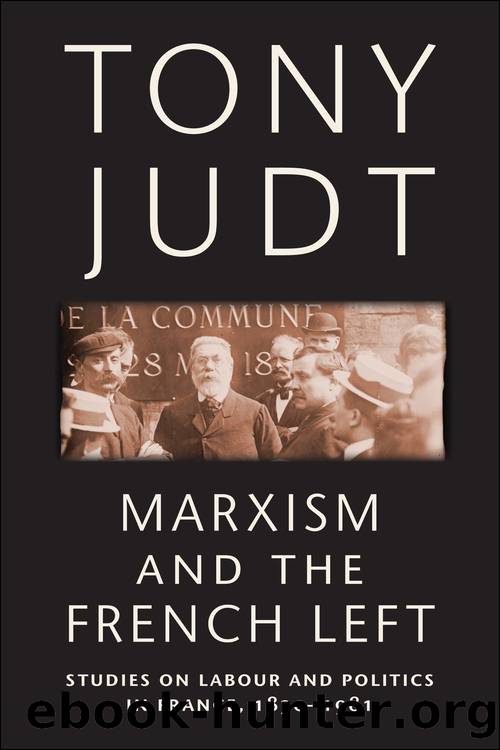Marxism and the French Left by Judt Tony

Author:Judt, Tony.
Language: eng
Format: epub
Publisher: New York University Press
Published: 2011-07-14T16:00:00+00:00
5
The Elections of 1981 in Historical Perspective
Les conditions d’une véritable alternance démocratique seront crées. Au lieu de conquérir le pouvoir une ou deux foix par demi-siècle, portée par de brefs mouvements d’humeur, la gauche apparaîtra comme la garantie permanente d’un bon gouvernement de pays.
François Mitterrand, interviewed in Libération 10 May 1984
IN 1981 French socialism won a famous victory at the polls. In the presidential elections of April/May, François Mitterrand first trounced the Communist candidate, Georges Marchais, then went on to defeat Giscard d’Estaing, the incumbent, and become the first popularly elected Socialist president of France. A month later, with parliament dissolved, Mitterrand’s Parti Socialiste won handsomely at the general elections, securing an abolute majority of the seats in the Assembly. This unprecedented sequence of electoral successes for the Left aroused tremendous enthusiasm and a great wave of optimism and expectation.1
The degree of exhilaration shown by the Left’s political constituency reflected the unexpected nature of the events of that spring. The Left had not won a national election since the founding of the Fifth Republic in 1958; moreover, the non-Communist Left had not since 1936 so clearly surpassed the PCF in national political preferences. And in none of the Left’s previous victories (1924, 1936, 1946, and 1956) had power been so utterly available for the taking. The very centripetal structures of the Fifth Republic could now be made to work for the forces of progress as they had for so long functioned to protect and strengthen the parties of the Ancienne Majorité. ‘La France’, as a magazine headline put it on 1 June 1981, ‘a basculé’.
Nor was this mere journalistic hyperbole—there seems to have been a widespread belief that the events of 1981 were an utter surprise (divine or otherwise). In a public opinion poll taken in May 1981, 53 per cent expressed themselves ‘surpised’ at Mitterrand’s election.2 Allowing for some schadenfreude from the losers, this still suggests that a substantial minority of left-wing voters no more expected to win in 1981 than in the previous elections of the Gaullist Republic. Little wonder, then, that there was such dancing in the streets—and such high hopes for an imminent social and political revolution, albeit peaceful. Small wonder, too, that the inevitable sequence of minor successes and frequent set-backs which followed were to result in declining support for Mitterrand and his governments, and in a heightened sense of disappointment and frustration. For in 1981 there was no ‘mur d’argent’, and such conservative bastions as the Senate and the Constitutional Council had strictly limited powers. What did not happen after 1981 would be attributed to Mitterrand’s failure to make it happen. The implications of this for the future of French socialism are considerable.
Although most voters are of necessity not assiduous students of political trends, it is a little odd that the surprise of 1981 should have been as sharp as it appeared (with consequent disillusion to match). For the course of events leading to the Socialists’ victory was far from obscure even well before the event.
Download
This site does not store any files on its server. We only index and link to content provided by other sites. Please contact the content providers to delete copyright contents if any and email us, we'll remove relevant links or contents immediately.
| Anarchism | Communism & Socialism |
| Conservatism & Liberalism | Democracy |
| Fascism | Libertarianism |
| Nationalism | Radicalism |
| Utopian |
The Secret History by Donna Tartt(16628)
The Social Justice Warrior Handbook by Lisa De Pasquale(11490)
Thirteen Reasons Why by Jay Asher(7790)
This Is How You Lose Her by Junot Diaz(5776)
Weapons of Math Destruction by Cathy O'Neil(5039)
Zero to One by Peter Thiel(4825)
The Myth of the Strong Leader by Archie Brown(4790)
Promise Me, Dad by Joe Biden(4450)
Beartown by Fredrik Backman(4421)
Stone's Rules by Roger Stone(4417)
How Democracies Die by Steven Levitsky & Daniel Ziblatt(4400)
The Fire Next Time by James Baldwin(4344)
100 Deadly Skills by Clint Emerson(4079)
A Higher Loyalty: Truth, Lies, and Leadership by James Comey(4033)
Rise and Kill First by Ronen Bergman(4012)
The David Icke Guide to the Global Conspiracy (and how to end it) by David Icke(3884)
The Farm by Tom Rob Smith(3873)
Secrecy World by Jake Bernstein(3784)
The Doomsday Machine by Daniel Ellsberg(3733)
